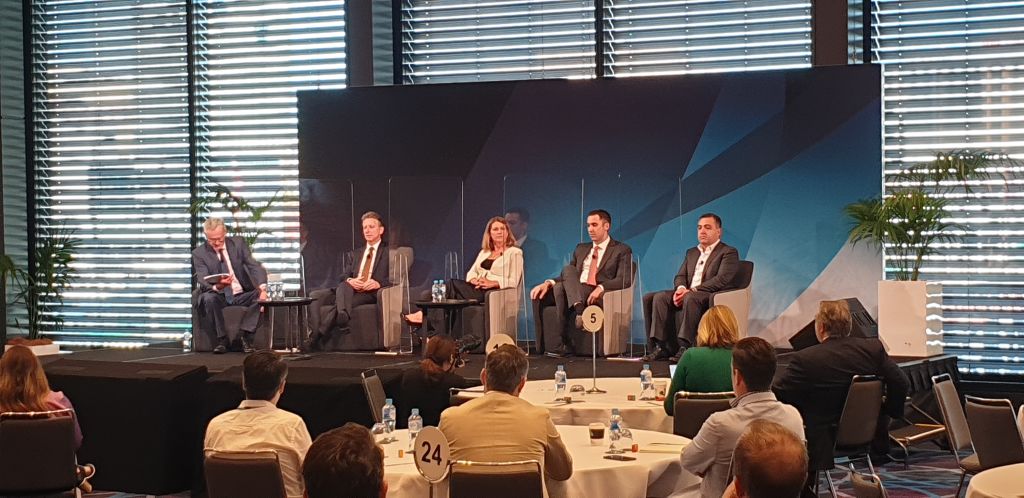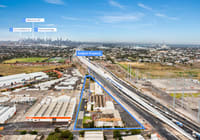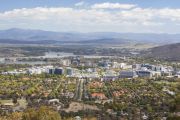
Get people back to the office or risk 'more painful' recession, Dexus says
Getting workers back into city offices is the key to boosting economic growth and shortening the effects of the COVID-19-induced recession, according to the country’s largest landlord.
“If we don’t get people back into the CBDs, back into work this recession is going to be far more painful than it needs to be,” Dexus chief executive Darren Steinberg told the 2020 AFR Property Summit in Sydney on Tuesday.
He estimated that presently 60 per cent of the Dexus workforce was in the office “at any one time”.
Prolonging work-from-home arrangements would crush innovation and would mean “we don’t get the multiplier effect into the small to medium businesses that inhabit the CBDs,” he said.
Mr Steinberg, who estimated that he currently worked from Dexus’ headquarters nine days a fortnight, said company leaders needed to demonstrate that the office was a safe environment by making the return to the office themselves.
“I implore business leaders to get their people back to work. The easiest thing to do right now is say, ‘Hey, we’ll stay at home and see how this thing plays out’ … I am absolutely certain that those businesses that get people back to work will have a sustained competitive advantage over those businesses sitting at home saying ‘We’re doing fantastically’.”
A ‘changed ecosystem’
Domain Group chief executive Jason Pellegrino, who was on a panel discussion with Mr Steinberg, said returning to the workplace wasn’t a simple case of reverting to pre-COVID-19 crisis arrangements.
“I’m a massive believer in the office as a hub for culture but I think we are kidding ourselves if we think the office of the future is going to be the same as the past,” Mr Pellegrino said.
He said the past six months had demonstrated that working from home could be done on a large scale.
“I think we need to think about the office as a space for something rather than as a location where you spend between nine and five, five days a week. When you actually remove that and start thinking about the use of office as a space, you can start really fundamentally as a business supporting flexibility,” he said.
Mr Pellegrino noted that the increased popularity of search terms like “home office” and regional locations like Wagga Wagga on the Domain residential listings website was an indication that people “intrinsically” understood that the nature of work was changing.
“I still don’t think the space we will need at Domain going forward is going to be the same as the space we’ve had in the past. I’m not talking about volume of space but I’m talking about the nature and layout of that space,” Mr Pellegrino said.
Another panelist, the chief executive of property at Lendlease Kylie Rampa, said the office environment would be a “changed ecosystem” after the pandemic.
“I think senior leadership and corporates now actually understand that flexible working can work very well. Everyone has had flexible working policies [prior to COVID-19] but I think today people actually see it as part of the ecosystem of the work environment and it can work very effectively. I think for talent retention organisations are going to need to have really strong flexible policies,” said Ms Rampa.
Adoption of flexible work policies would see the corporate headquarters transition into a place where “people come together to brainstorm, collaborate, drive energy [and] really adopt the corporate culture” rather than simply a location for workers to sit at a desk.
Hub-and-spoke model
As part of an effort to be more flexible, employers might also adopt a “hub and spoke” property strategy, Ms Rampa said.
“Most people aren’t set up to work effectively from home but is there a hub-and-spoke structure that you want to adopt across your own workforce where you’re providing greater flexibility and a great work environment closer to somebody’s home. I think the whole ecosystem of the office will be looked at in a holistic sense on a go-forward basis,” she told the audience.
Mr Pellegrino cited Google’s strategy of expanding both its San Francisco and Mountain View office premises as a way companies could cut employee commute times but still facilitate face-to-face interaction.
“I think there’s a really interesting opportunity to not think about the office just as the hub, the single corporate hub, but potentially a hub-and-spoke,” he said.
“We always thought about just having a single office in key states and big cities and maybe some of the small ones we can work remotely in and out … I think we can start using demand, supply and particularly talent in regional areas now.”










